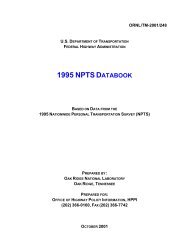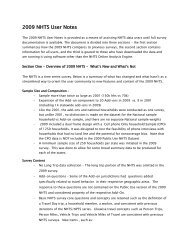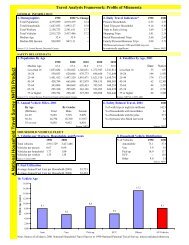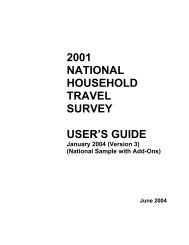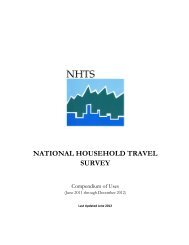Uses of National Household Travel Survey Data in - NHTS Home ...
Uses of National Household Travel Survey Data in - NHTS Home ...
Uses of National Household Travel Survey Data in - NHTS Home ...
Create successful ePaper yourself
Turn your PDF publications into a flip-book with our unique Google optimized e-Paper software.
Energy Consumption<br />
Us<strong>in</strong>g <strong>National</strong> <strong>Travel</strong> <strong>Data</strong> <strong>in</strong> State Energy Master Plann<strong>in</strong>g: Gaps and Opportunities <strong>in</strong> <strong>National</strong><br />
Transportation <strong>Data</strong><br />
Authors:<br />
Buehler, Ralph; Lovrien, Nora<br />
Transportation Research Board - 500 Fifth Street, NW Wash<strong>in</strong>gton, DC 20001<br />
TRB 87th Annual Meet<strong>in</strong>g Compendium <strong>of</strong> Papers DVD<br />
Transportation Research Board 87th Annual Meet<strong>in</strong>g<br />
2008<br />
Abstract:<br />
S<strong>in</strong>ce the oil crises <strong>of</strong> the 1970s states, cities, and other local governments around the United States have<br />
participated <strong>in</strong> energy plann<strong>in</strong>g exercises with the purpose <strong>of</strong> reduc<strong>in</strong>g vulnerability to future crises. In the<br />
last decade as climate change has emerged as a major challenge <strong>of</strong> the 21st Century, state governments<br />
are also sett<strong>in</strong>g greenhouse gas reduction goals. The transportation sector makes up as much as 29% <strong>of</strong><br />
total energy consumption <strong>in</strong> the United States. Individual level travel is arguably the most amorphous<br />
sub-set <strong>of</strong> the transportation sector that is nonetheless responsible for a substantial portion <strong>of</strong> the sector‟s<br />
energy use and carbon dioxide emissions. This paper reviews some <strong>of</strong> the challenges faced by state<br />
energy planners to truly understand<strong>in</strong>g the nature <strong>of</strong> energy use <strong>in</strong> <strong>in</strong>dividual, on-road daily travel<br />
behavior. It is imperative for practitioners to have a greater understand<strong>in</strong>g <strong>of</strong> <strong>in</strong>dividuals‟ travel choices<br />
and behavior, from the levers that guide mode choice, to the type <strong>of</strong> vehicle chosen, the style <strong>of</strong> driv<strong>in</strong>g<br />
practiced, and the rigor <strong>of</strong> the vehicle‟s ma<strong>in</strong>tenance. The paper uses the case study <strong>of</strong> the New Jersey<br />
Energy Master Plan to illustrate some <strong>of</strong> the challenges <strong>of</strong> design<strong>in</strong>g effective policies aimed at reduc<strong>in</strong>g<br />
energy consumption <strong>in</strong> the <strong>in</strong>dividual, on-road transportation sector. The paper then suggests that by<br />
extend<strong>in</strong>g exist<strong>in</strong>g national travel surveys, more helpful energy use data may emerge. This may help to<br />
focus efforts <strong>of</strong> avoid<strong>in</strong>g or abat<strong>in</strong>g transportation sector emissions, by explicitly l<strong>in</strong>k<strong>in</strong>g <strong>in</strong>dividual travel<br />
behavior and energy use. We demonstrate this approach us<strong>in</strong>g the 2001 <strong>NHTS</strong>.<br />
Subject areas and Index Terms<br />
Energy; Environment; Highways; Plann<strong>in</strong>g and Forecast<strong>in</strong>g; Public Transportation; Society; I72: Traffic<br />
and Transport Plann<strong>in</strong>g<br />
Climate change; Energy consumption; Greenhouse gases; Land use plann<strong>in</strong>g; Master plans; Mode choice;<br />
Transportation plann<strong>in</strong>g; New Jersey; <strong>Travel</strong> data<br />
Availability: Transportation Research Board Bus<strong>in</strong>ess Office<br />
8



